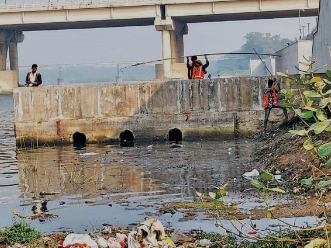Ahmedabad: The Gujarat High Court has intensified its scrutiny of industrial water management practices, demanding a halt to the practice of dumping treated industrial effluents into the Sabarmati River. This call to action, issued on Friday, highlights the need for industries to redirect treated wastewater for reuse rather than contributing to river pollution and subsequent soil contamination, which poses a significant threat to agriculture downstream.
In a suo motu Public Interest Litigation (PIL) addressing river pollution, the Chief Justice and Justice underscored the inadequacy of the current treatment and disposal practices. The court reiterated its previous stance that effluents treated at Common Effluent Treatment Plants (CETPs) must undergo additional processing to make them suitable for industrial reuse. This measure aims to mitigate the adverse effects of effluent dumping on the river’s ecosystem and surrounding soil quality.
The court’s renewed urgency follows the circulation of a video on social media, which showcased pollution from the MEGA pipeline near Vasna. The Chief Justice expressed concern over the continued use of groundwater by industries, questioning the rationale behind consuming pure water resources when alternative reuse options exist. The Chief Justice remarked, “We are facing a water scarcity crisis, and industries should be encouraged to utilise treated water from CETPs instead of relying on groundwater.” The court also raised concerns about the impact of industrial effluents on soil quality, highlighting issues such as increased metal content and potential health risks like cancer and rheumatoid arthritis. The Chief Justice emphasised the necessity for CETPs to ensure that treated water meets high purity standards before being used by industries.
Additional Solicitor General representing the Gujarat Pollution Control Board (GPCB), was instructed to consult with all stakeholders and expedite the process of implementing these directives. The Chief Justice strongly opposed any consideration of deep-sea discharge as an alternative, stressing that the ocean and deep sea should not be exploited for waste disposal. The GPCB has been tasked with reassessing its strategies and ensuring compliance with the court’s order. The Chief Justice underscored the urgency of the situation, stating, “We are in a critical condition. Immediate and effective measures are required to address the water crisis.”




